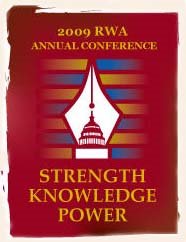 Honestly, I hadn’t planned to go to this workshop. I’ve read articles, attended presentations, and done pitches already. Pitching is second only to writing a synopsis in my list of things I’d rather run through a swarm of angry bees than do. However, when I looked at the lineup of presenters, I decided it would be highly entertaining as well as educational…and I had a pitch to do later in the day so the timing seemed fortuitous.
Honestly, I hadn’t planned to go to this workshop. I’ve read articles, attended presentations, and done pitches already. Pitching is second only to writing a synopsis in my list of things I’d rather run through a swarm of angry bees than do. However, when I looked at the lineup of presenters, I decided it would be highly entertaining as well as educational…and I had a pitch to do later in the day so the timing seemed fortuitous.
The full title of the workshop is How to Make the Perfect Pitch (without Striking Out). The speakers were: Christie Craig, Faye Hughes, Caren Johnson, Christopher Keeslar, and Kim Lionetti. For anyone who’s never heard Christie and Faye speak, you should know that they are hilarious. And who better to discuss the fine points of pitching than the folks we’re pitching to: an editor and two agents?
I kid you not when I say that this workshop completely changed the attitude with which I approached my pitch later that afternoon. And you know, the pitch went ten times better as a result.
So what made this workshop so life-changing for me? First, they got us laughing with a video about how NOT to pitch, featuring Kim Lionetti and Chris Keeslar literally chained to their chairs in the “pitch room”. So that relaxed the audience.
Relaxation is the key. The single most important thing I learned was something I’d heard before but from a different angle. Everyone always tells you not to be nervous because editors and agents are nice people who don’t bite, and one pitch isn’t going to make or break your career. It won’t even generally affect whether they request the book or not. All very, very true, but none of it ever stopped me from developing a flop sweat before I went in to pitch.
Here’s the point that revolutionized my thinking: Don’t make the agent or editor focus on YOU rather than your book. If you’re overtly anxious, shaking, or sweating, they’re going to waste time and energy trying to calm you down. You want all their time and energy directed toward your masterpiece.
This comment was reiterated by all the industry pros on the panel. It makes THEM nervous when the author is nervous. They want to be able to relax and enjoy your pitch, not worry that you are going to have a mental breakdown at any moment.
Doesn’t that make total sense?
Okay, on to specifics.
Here’s what to include in your pitch:
1. High concept, as in, Godzilla meets Sleeping Beauty;
2. Very short synopsis OR Goal/Motivation/Conflict for the main character, if that works better for you. This should be 2-3 sentences long and include:
Situation
Character
Objective
Opponent
Disaster.
Another way to approach this is to answer these questions about the heroine/hero:
Why are they appropriate to the book?
What makes them distinctive?
Why do we care?
What’s most interesting about them?
What’s the push and pull between them?
What creates the dynamic for the relationship?
3. A sense of the writing tone by comparing it to another well-known author;
4. Word count;
5. Genre;
6. If you have publishing credentials which are relevant to the project you are pitching, mention them at the end of the pitch.
Presentation Tips:
1. Practice with someone who will give you a good critique.
2. Practice pitching someone else’s book or movie. It can give you insight into what’s most important.
3. Research who you’re pitching to so you can personalize it a bit. For example, mention you love an author they represent or edit.
4. Breathe!
5. Pay attention to your pitchee’s responses. Do they look bored? Concerned? Confused? Adjust!
6. Be passionate about your work! Demonstrate why you care about this book.
7.Convey the pitch in a short time so the agent/editor has time to ask questions and go deeper into what interests them.
8. Show you’re a professional by staying calm and knowing what you’re trying to accomplish. Remember: you’re the expert on your book and present yourself that way.
9. Talk in a natural way which means keeping the “blurb” short.
10. Feel free to ask business-related questions if you have time.
Here’s what NOT to do:
1. Do not rush through your prepared pitch.
2. Do not read your pitch. Note cards are okay if you must refer to them, but this is supposed to be more of a conversational meeting.
3. Do not include extraneous information. There’s no time for it.
4. Do not pitch more than one project. You have to show that this project is your passion. If it’s one in a series, you can touch briefly on that fact at the end of the pitch.
5. Do not mention you’ve self-published a book unless it sold 10,000 or more copies.
Chris Keeslar noted that he will almost always request the book pitched to him if it’s in a genre he publishes. If your pitch really excites him, he’ll read your submission first. (He also mentioned he only buys straight contemporary romances if they have humor in them.)
Kim Lionetti said you build relationships by meeting agents and editors at conferences over time. She feels the face-to-face meetings are valuable.
All the industry pros confirmed that submissions made as the result of a face-to-face pitch go on the top of their reading pile. So you see, the angst is well worth it.
